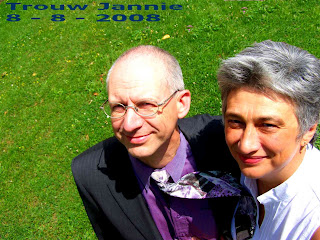Well, I had been looking forward to it since a couple of days, we're back in Zim!
Visiting Belgium always is a bit of busy running around with backpacks and trying to see as many people in as little time as possible, but still have quality time.
So yesterday we got back into Harare, again with Ethiopian Airlines and their precious 45kilo allowances of which we make the most. Veerle had come to pick us up just before they are leaving to Madagascar. All of Volens cooperants seem to be away for now, holidays to Belgium or elsewhere. It does mean that nobody seems to be really waiting for us. But it was nice getting back home, where the paint has arrived so we can make it even more homely soon.
Dexter, our cat and pathetically enough one of the main reasons I was anxious to get back, was fine, had gotten bigger but remains tiny if I compare him with Harry, our cat in Liege.
And now, I got the bike back out, am back at the office with the uncertain internet connection, still trying to get my hands on some Zim money but to no avail so far. It'll be another meatless meal today I fear...
Thursday, August 14, 2008
Saturday, August 9, 2008
My second tattoo
When I turned twenty four, after graduating and leaving Belgium on my first real job, I got my first tatou. It was based on the Arab word for respect, but with added symbolism.

Now, for my thirtiest birthday, and while starting out in Africa as a continent to explore, I got my second, based now on the chinese symbol for "balance". It is placed on my upper left thigh, symmatrical with the first one which is on the left thigh (with a birth mark in the center).


The last image is a picture of how it looks on my skin, freshly put on today...

Now, for my thirtiest birthday, and while starting out in Africa as a continent to explore, I got my second, based now on the chinese symbol for "balance". It is placed on my upper left thigh, symmatrical with the first one which is on the left thigh (with a birth mark in the center).


The last image is a picture of how it looks on my skin, freshly put on today...
Friday, August 8, 2008
Trouw van ons moeder, Annie en Jan

Deze dag, 8-8-8, hadden Jan en ons moeder gekozen om hun huwelijk te houden.
Eerst naar het stadhuis, met dichte vrienden en familie, dan naar het parochiezaaltje om het feest te houden.
Buffet, de kinderen die voor jeugdfoto's hadden gezorgd om te projecteren en een kleine kwis, muziek. Tot tegen 23u30, toen we nog snel gingen opruimen.
Veel geluk gewenst aan het paar!
Saturday, August 2, 2008
Solution Focused Therapy : Miracles?
While I am here in Belgium, I wanted to use my time here to look for some of our Western therapeutic tools, especially the ones developed for dealing with children and bereavement or traumas. Through Gérald Brassine, a Belgian psychologist who spent some time working in the USA, I came across the solution focused therapy.
Solution focused brief therapy (SFBT), often referred to as simply 'solution focused therapy' or 'brief therapy', is a type of talking therapy. It focuses on what clients want to achieve through therapy rather than on the problem(s) that made them seek help. The approach does not focus on the past, but instead, focuses on the present and future. The therapist/counselor uses respectful curiosity to invite the client to envision their preferred future and then therapist and client start attending to any moves towards it whether these are small increments or large changes. To support this, questions are asked about the client’s story, strengths and resources, and about exceptions to the problem.
The Miracle Question The miracle question is a method of questioning that a coach or therapist uses to aid the client to envision how the future will be different when the problem is no longer present. Also, this may help to establish goals.
Solution focused brief therapy (SFBT), often referred to as simply 'solution focused therapy' or 'brief therapy', is a type of talking therapy. It focuses on what clients want to achieve through therapy rather than on the problem(s) that made them seek help. The approach does not focus on the past, but instead, focuses on the present and future. The therapist/counselor uses respectful curiosity to invite the client to envision their preferred future and then therapist and client start attending to any moves towards it whether these are small increments or large changes. To support this, questions are asked about the client’s story, strengths and resources, and about exceptions to the problem.
The Miracle Question The miracle question is a method of questioning that a coach or therapist uses to aid the client to envision how the future will be different when the problem is no longer present. Also, this may help to establish goals.
A traditional version of the miracle question would go like this:
-
- "Suppose our meeting is over, you go home, do whatever you planned to do for the rest of the day. And then, some time in the evening, you get tired and go to sleep. And in the middle of the night, when you are fast asleep, a miracle happens and all the problems that brought you here today are solved just like that. But since the miracle happened over night nobody is telling you that the miracle happened. When you wake up the next morning, how are you going to start discovering that the miracle happened? ... What else are you going to notice? What else?"
Subscribe to:
Comments (Atom)
